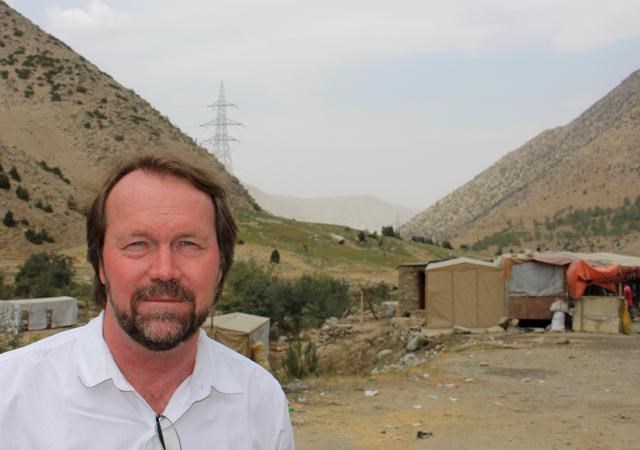By Greg Nikkel
Jeff McMurdo is working to make a difference in Afghanistan, as he helps ensure his agency will save lives in the long run as they seek to make the country a safer place to live.
For the past two years, McMurdo has been the program manager for the United Nations Mine Action Service Office based out of the capital of Kabul, Afghanistan.
The work can be intense and very busy, he said, but it is “more on the level of security and life and death. Their futures are in the balance, so you feel privileged to be involved in that. The work is really interesting, but it’s very satisfying too.”
He grew up in Moose Jaw, but has a brother, Barry, and a cousin, Duane Schultz, who both live in Weyburn, and his grandfather came to Weyburn when he settled in Canada. Jeff was in Weyburn for a visit when he took some time to talk about his work.
Asked how he got involved in this project, McMurdo said he first visited Kabul in 2001 when he was working for a non-government organization (NGO), which was an international organization concerned with the migration of internal refugees within Afghanistan.
“I had always wanted to go back,” he said, explaining he began travelling when he was 22 years old, and felt he would like to be involved with international development and worked with the NGO for about 10 years. For the last seven years, he has been working with the United Nations, and took this position when it came open.
“In the last 40 years, I’ve lived in Canada maybe 12 years,” he said, noting he hasn’t lived in Canada since 2000, but will return here in about four years time.
In his United Nations position in Kabul, he works with the Afghan government coordinating technical support, advisory support and fundraising support, working with 140 national staff and six international staff, with six regional offices around Afghanistan. Canada is the second largest donor to the landmine eradication program after the United States.
McMurdo is proud to note that the effort to find and eliminate land mines is a mostly Canadian-led effort, and has been noted globally, with other international de-mining efforts following their lead, and modelling their program on the UN’s program Afghanistan.
When they began, they were the most mine-contaminated country in the world, but they were also the first to begin the effort to clear and remove land mines. Now, with about 78 per cent of the known land mine fields cleared, they rank about the fourth-most contaminated country for land mines.
“There were so many people getting killed by mines, they realized they needed to do something very quickly,” said McMurdo, noting that as foreign military forces were reluctant to come in and do it, the United Nations stepped up and said they would start a de-mining program.
One of the problems they’ve encountered is the constant discovery of more minefields, which is keeping the 22-per-cent uncleared number static as they get more to clear.
“We make progress every year, but when we search and find new fields, that number fluctuates,” he said, referring to the number of mine fields left to be cleared.
In addition to the danger of land mines, they are also finding fields of unexploded ordinants, such as anti-tank and anti-personnel mines.
Where things get dicy is when there are roadside bombs; if they have been planted by group with political affiliations, the UN can’t really touch them, but they pass on the information about the bombs to the Afghan military to take care of.
“It’s a great program that we’re on, but it’s very challenging. The Afghan staff is great,” he said, noting unfortunately they get caught up in the turmoil that continues to be ongoing in that country.
Currently, in addition to the Taliban (which is still in conflict with the government), ISIS is now trying to make inroads, and are fighting the Taliban as well as the Afghan military.
Asked if there are violent incidents or bombings going on in Kabul, McMurdo said there are not incidents every day, but there have been suicide bombers and vehicle bombs every once in a while.
He noted the last large explosion in Kabul was on Jan. 15 which killed a number of people.
The UN staff live in secure compounds with a private security force guarding it.
“The UN has not really been affected, but sometimes the national staff get caught up in incidents,” said McMurdo.
Due to these ongoing security concerns and the busy nature of his work, there isn’t a lot of time for going out to market places or restaurants in Kabul, although he noted that Afghanistan is actually quite a beautiful country.
“Work is so busy and security issues are things you deal with, sometimes my life is monastic,” he said, with meetings keeping him busy for long hours each week.
With six regional offices around the country, he is sometimes able to get out into the field, but “more and more in the last year, it’s become more constrained.”
In spite of the challenges, however, “mine clearing work is very satisfying,” said McMurdo.
He is able to come back to Canada to visit family every couple of years. As his wife is from Ontario, and his family is here in Saskatchewan, they are able to split their time between the two provinces.
Asked if there is anything about Canada that he misses while working in Afghanistan, McMurdo thought for a moment and shook his head.
“I wouldn’t say I miss things from Canada, but home is always nice to come back to,” he said.
“I miss the prairies. Of all the places I’ve seen in the world, I still think Moose Jaw is one of the best.”



